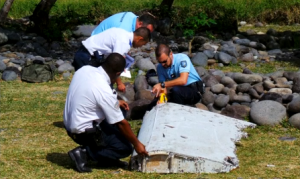
(Reuters) — Malaysia said on Sunday that airplane debris that washed up on the Indian Ocean island of Reunion has been identified as being from a Boeing 777, the same model as a Malaysian Airlines plane which vanished last year.
Experts hope the 2-2.5 meter (6.5-8 feet) wing surface, known as a flaperon, and a fragment of luggage also found on Reunion could yield clues on the fate of Flight MH370, which disappeared without trace in March 2014 with 239 passengers and crew on board.
“We know the flaperon has been officially identified as being part of a Boeing 777 aircraft,” Transport Minister Liow Tiong Lai said in a statement.
“This has been verified by French authorities together with aircraft manufacturer Boeing, U.S. National Transportation Safety Board (NTSB) and the Malaysian team.”
The barnacled plane part was flown to Paris on Saturday and was taken to Toulouse to undergo more detailed analysis.
Representatives from Malaysia, the United States, China, France and Boeing are due to participate in a “verification” of the flaperon on Wednesday.
Low said Malaysia is contacting authorities in territories around Reunion to see if they can help if other objects suspected to come from a plane are found.
More pieces of metal debris found washed up on Reunion were taken into police custody on Sunday but it is too early to say what they are, said a source close to the French investigation.
Discovery of the debris may finally confirm MH370 crashed into the sea after veering off course from Kuala Lumpur to Beijing, helping to end 16 months of lingering uncertainty for relatives of the passengers and crew.
Investigators believe someone deliberately switched off MH370’s transponder before diverting it thousands of miles off course. Most of the passengers were Chinese.
The debris will be analyzed at a lab staffed by 600 experts that is operated by the French defense ministry.
The luggage fragment has been sent to a police unit outside Paris that specializes in DNA tests.
If the serial number on the flaperon confirms that it is from Flight 370, then the laboratory can use sophisticated tools to try to glean more information about the causes of the crash, such as whether its shape corresponds more to a mid-air explosion or a crash into the ocean.







